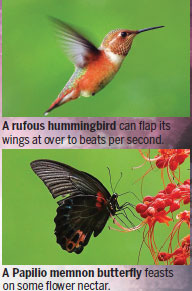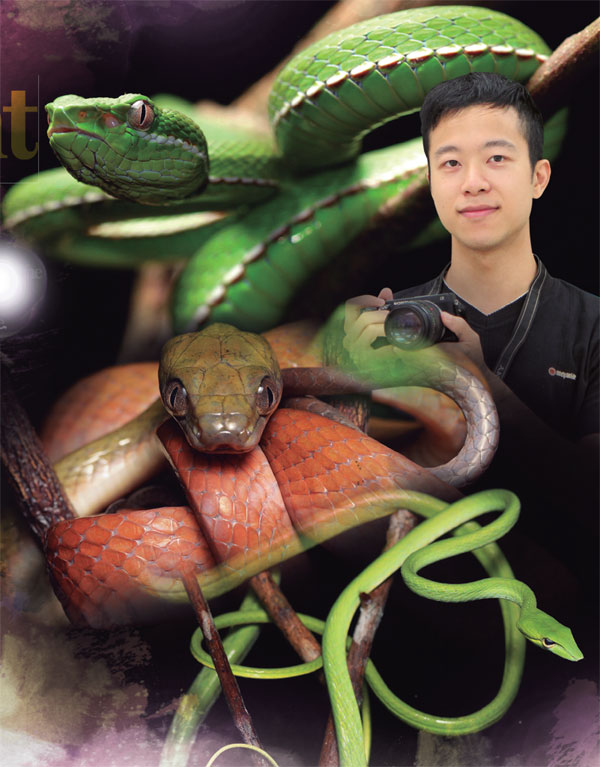Night stalker
Updated: 2016-10-11 09:45
By Sylvia Chang(HK Edition)
|
|||||||||
In dark of night, deep in forests, Sam Yue helps to discover a primitive world, far removed from HK's blazing skyline. Sylvia Chang reports.
Late, he steals into deep woods. There, with breath abated, he listens and waits, like a hunter, stalking his prey. Sam Yue does not come to kill, but to enter a dialogue through his camera lens, with the wild creatures who hunt under shelter of night. Silently he awaits his perfect opportunity until some wild creature emerges from the forest. Then a beam of light flashes as he presses the button and captures the moment with his camera.
These are magic moments, as his own voice seems magically to emerge from this dialogue with each of the creatures he encounters. It is a voice he uses to speak to the public about wildlife and ecology through photographic images. He says "hello" to each animal he meets in his own way. It is through photography that he is able to communicate in a way that most people are able to understand.
A PhD student in the School of Biological Sciences at the University of Hong Kong (HKU), Yue won two honors at this year's Prix de la Photographie Paris (P3), a prestigious Paris-based photographic competition. His entry - Serpent, comprising four photos, was awarded the Silver Prize and an Honorable Mention in the nature category, among non-professionals and students.

The photographs feature four types of snakes, with each wrapped around branches or the knots of trees and captured in the wild during his photographic excursions in Borneo, Hong Kong and Taiwan.
Wearing a light-colored T-shirt and carrying a white eco-friendly cloth bag on his arm, this 20-something young man seemed shy of reporters. He is rather a taciturn fellow, anyway, unless he's speaking about wildlife.
"I hope my photos can dispel misconceptions about wild animals, especially the ones about snakes and frogs that they are disgusting and dangerous. In fact, they can be super cute and gentle," Yue said, while warning photo enthusiasts not to be aggressive while hunting in the wild.
He paused to reflect. At times his mind seemed to have wandered off, unearthing fresh thoughts about his hobby, his obsession with wild animals. Then the lights came back on, his voice rose as he rattled off the names, origins, evolution and behaviors of each species that have come to mind.
He prefers to go alone, at night, on his photographic rambles. "It's a time when most animals are active," he said.
Yue was surprised that his work did so well in the competition. He said he had not expected any recognition and did not even enter until a few days before entries closed.
"This was the first time I submitted my work to an international competition and I just wanted to try my fortune," he said. The awards provided considerable encouragement for him to pursue his passion for wildlife photography.
He traced his love of wildlife back to his early childhood in Canada, watching the television adventure documentary - Crocodile Hunter, hosted by Steve Irwin.

Seeing Irwin nestling a baby crocodile in his arms, 7-year-old Yue got the impression that "animals are fun to play with". A seed of dream to travel around the world and say hello to all animals on the earth was planted in his mind.
For most people, childhood dreams pass like fireworks and are gone. Yue's childhood dream pressed him onward. He majored in zoology when he took up his post-secondary studies.
Yue's dream blossomed when the opportunity opened for him to sojourn in the Borneo jungles in Southeast Asia for a year to prepare his thesis. In the remote area, rich with wildlife, Yue described himself as feeling like a wild bird, who has escaped from its cage.
"I tried to record everything I saw (with the camera), regardless of whether I was seeing known or unknown wildlife," Yue recalled. From mammals, like the Proboscis monkey and Bornean elephant, to amphibians, including the Guardian frog and Matang narrow-mouth frog, and various flying creatures, hundreds of animals have been caught through his lens.
Now having returned to Hong Kong, where he was born, Yue is considering establishing his career in subtropical climes. "With dozens of country parks and conservation areas, this is a great place to develop my passion in zoology," he said.
He now focuses on shooting less well known species, like snakes, frogs and insects. "I'd like to raise more public awareness on protecting and appreciating these animals," he added.
With assistance from HKU, Yue has begun to lead ecological tour groups and introduce wildlife to the public. With about 15 people following close behind, Yue sets off at night into the local country park, after giving a brief introduction describing the wildlife in the park. As the tour moves along the paths, he goes into greater depth and explains the habits of animals that may be encountered on the tour. The tour lasts for three hours. The group usually meets two or three species of snakes, tens species of frogs and insects.
"This is called the bamboo pit viper, which is venomous," Yue introduces a snake which helped him earn the photography award, "It's a female since there is no white line between its green-yellow-chequered patterns. The pit viper has weak eyesight and cannot hear. It can remain almost motionless, coiled to strike for days, relying on its keen sense of smell to detect the heat of approaching prey."
A fresh student in his PhD program, Yue said he hadn't decided on his research objective but his passion for wildlife photography still inspires him. He believes there is an absence of awareness toward animal rights in Hong Kong. That may become another area for him to explore, for the time being, he feels he is still rediscovering his birthplace back in Hong Kong.
Contact the writer at
sylvia@chinadailyhk.com


(HK Edition 10/11/2016 page8)